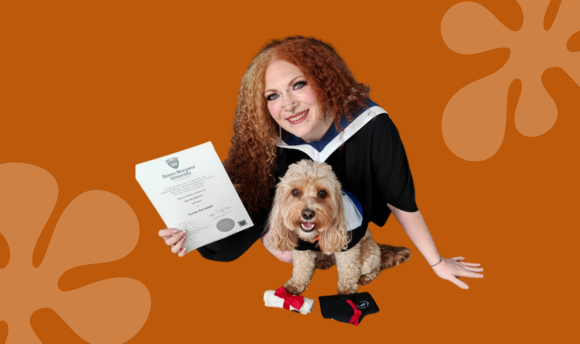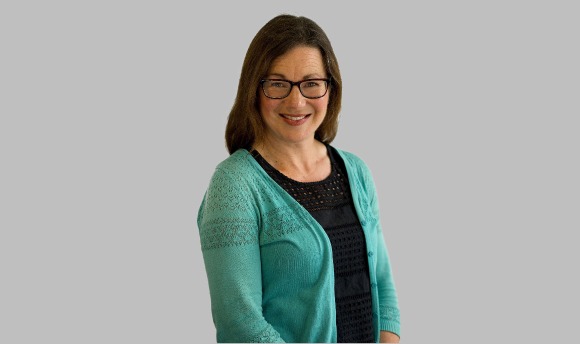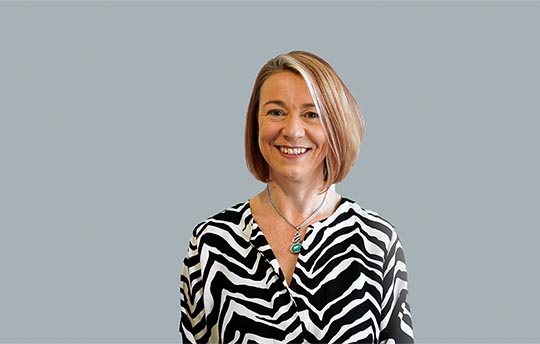Dramatherapy - MSc
If you have at least one year’s experience of working alongside others in a caring/support/facilitative capacity within a mental or physical health setting, as well as experience of drama/theatre or other action-based creative processes, this MSc in Dramatherapy could be your route to a new rewarding career.
Established in 2022, this pioneering course represents the only opportunity to train as a dramatherapist in Scotland and is an exciting development in the life of the dramatherapy profession here. It brings together an immersive experience in creative, embodied expression, dynamic and progressive approaches to understanding therapy in a contemporary context and the chance to work in diverse practice based learning settings alongside others. The life changing potential of applying drama-based approaches to psychotherapy practice are further enhanced by engaging regularly with students of other arts therapies (art and music) disciplines.
The course will help you build on your interpersonal, facilitation and creative skills to develop new competencies as you work towards professional registration as a dramatherapist. It offers a creative approach to working with others and includes supervised practice placements as a vital part of the learning process.
This course leads to eligibility to register with the Health & Care Professions Council (HCPC) and use the protected title of ‘dramatherapist’.
Why QMU?
- Unique in Scotland: This is the only accredited dramatherapy course in Scotland, inviting you to be at the forefront of this pioneering development in the profession.
- Staff expertise: Staff come from diverse and varied practice contexts, with decades of experience of the application of dramatherapy in Scotland, across the UK and internationally. They have been at the forefront of some of the local and national developments of the profession here and bring contemporary and relevant knowledge to the student experience.
- Placement opportunities allow you to put your learning into practice: You’ll benefit from our well-developed partnerships with statutory and third sector organisations, resulting in excellent placement opportunities working with a variety of client groups, including schools, the NHS, social care, community settings and other organisations.
- Interdisciplinary working: Dramatherapy sits alongside Music and Art Therapy at Queen Margaret University. This provides a unique opportunity to benefit from rewarding interdisciplinary learning from our colleagues across these modalities, sharing learning opportunities with a larger community of arts therapies students.
- International recognition: The course is proud to have an international perspective. It carries 200 credits that are transferable across Europe.
- Student diversity: Students on arts therapies courses usually come from across the globe, which makes for a very rich and interesting learning experience.
- Professional accreditation/registration: The course meets the requirements of the Health & Care Professions Council (HCPC) Standards of Proficiency for Dramatherapists. Graduates are eligible for registration with the HCPC as Registered Dramatherapists and are eligible for full membership of the British Association of Dramatherapists (BADth). Student membership of BADth is also possible while a student on the course.
Studying MSc Dramatherapy
Dramatherapists employ the imaginative, symbolic and metaphoric processes inherent to drama and theatre in live explorations with and alongside persons who attend therapy. A person’s internal world - their experiences and feelings - are given creative and symbolic expression in the external world through different dramatherapy processes and structures.
Experiences can be explored and ‘held’ by the safe use of the art form and expressive processes. This may include role play/improvisation, stories, movement, masks, puppets/small objects and other materials and methods that engage a person’s imagination. You will engage in these processes yourself throughout the training and learn how to meaningfully apply these to various settings in working alongside others.
Through practice-based learning in a range of settings, you will support others to access their creative capacities and foster therapeutic relationships that are conducive to building self-understanding, growth and change. You could work with people of any age and from diverse backgrounds and settings, individually or in groups, facilitating them in using dramatic forms to communicate and express themselves and engaging with a whole range of human experiences.
Dramatherapy can work to support someone in navigating their experiences and relationships, including those that cause them distress, by providing a safe, consistent and reliable environment, and the MSc training will give you a foundation in this practice.
In line with HCPC standards, dramatherapists and those in training engage in ongoing work to recognise the impact of societal and intersectional factors, and to address their cultural and ethical responsibilities to persons coming for therapy with humility and openness.
Structure and exit awards
You must complete the full MSc (200 credits) to be eligible to register with the HCPC and to work as a dramatherapist. Single module study is not available, but we do offer an Introduction to Dramatherapy short course (non-credited).
Teaching, learning and assessment
As a student on this course, you will be engaged in a range of learning opportunities and pedagogical approaches. These include:
- Learning within your practice group - A key focus of the learning is in dramatherapeutic processes. You will work alongside the dramatherapy cohort, engaging in workshop-based, group processes including play, dramatic projection, role work, dramatic enactments, movement, symbol and metaphor, storytelling, myth and ritual, and their application to this psychotherapeutic approach. You will also attend a weekly process group to support your interpersonal learning.
- Theoretical studies - Through attending lectures and talks from practitioners, seminars, journal clubs and workshops; you will form a foundational knowledge of the theory and practice of dramatherapy, the Arts Therapies and Psychotherapy more broadly, that will inform your own developing practice.
- Practice-based learning - Two practice placements will build on your experiential and theoretical learning and allow you to apply your developing skills within health, education and community settings, with the guidance of a Practice Educator. You will receive Clinical Supervision with a course tutor in Year One and an external Dramatherapy Supervisor in Year Two. This external supervision in Year Two applies to the MSc Dramatherapy course only and is an additional cost to students on this course.
- Interdisciplinary learning - You will study alongside your peers from MSc Art Psychotherapy and MSc Music Therapy for some key modules. This includes Peer Assisted Learning time in cross-disciplinary groups.
- Independent Study - You will engage in independent study and research at postgraduate level, including a 40-credit Independent Academic Project, focused on a research question of your choice in Year Two. This will be supported by a supervisor and by seminars in research methods and approaches.
The MSc Dramatherapy engages learners in a range of assessment methods. These include:
- Assessed facilitation with peers to demonstrate developing applied skills.
- Essays on the theoretical foundations of practice, including Dramatherapy theory and Psychotherapeutic approaches.
- Viva presentations on aspects of your developing practice on placement.
- Completion of two practice placements to HCPC Standards for trainees.
- Arts-based responses and reflections.
- Ongoing, formative assessment in small groups, including small group and individual facilitation
- A Project on a research topic of your choice, connected to your Year Two placement experience.
- There are also devised therapeutic performances at the close of the course.
Placements
Placements are vital to your learning process. It is your opportunity to facilitate for others the creative and therapeutic skills, structures and qualities that you are developing and engaged in on the course. You will undertake two supervised practice placements, each spread over two semesters. In Year One, this will be one day per week and in Year Two it is two days per week. Your placements could be in various settings throughout Scotland, including education, voluntary and healthcare environments.
Please note that there are additional costs associated with placements. Please see the ‘Other fees’ section under the ‘Entry requirements’ tab for more details.
Teaching hours and attendance
In-person classes in Year One take place at QMU across two days per week (Tuesday and Wednesday) and in Year Two across one day per week (Thursday). You will attend practice placements throughout the course. All students will be required to carry out independent learning.
Class sizes
The dramatherapy learning cohort each year is approximately 15 students. Some modules have larger class sizes due to shared learning with MSc Music Therapy and MSc Art Psychotherapy students.
Teaching staff
You can read more about the teaching staff on this course at the bottom of this page. Please note that teaching staff information is subject to change.
Year One
You will study the following modules:
- Dramatherapy Practice and Resources (30 credits): This module focuses on the core skills, experiential work and practice of dramatherapy. Delivery is through a range of approaches, with the main focus on experiential, studio-based workshops within the MSc Dramatherapy cohort (around 15 persons). Through diving into the work and play of dramatherapy, you will learn through doing, experiencing and reflecting on the core processes and structures of dramatic and therapeutic work. This includes work with story and myth, role, dramatic enactment and improvisation, ritual, embodiment, and therapeutic theatre. Assessment is through one peer facilitation and one essay.
- Arts Therapies Studies 1 (30 credits): This module introduces those in Art, Drama and Music Therapy to developmental, person centred and psychological theories that have informed the practice of the arts therapies. You will also learn about different research methodologies and understand the applicability of different research methods in practice. The learning experience will include lectures, seminars, workshops, discussion groups and peer-assisted learning. These will be tutors across all three arts therapies courses, students and experts by experience. Assessment is through one essay.
- Practice-based Learning (Placement) 1 (40 credits): This module aims to prepare and support you for practice that adheres to the HCPC Standards of Proficiency for Arts Therapists (Dramatherapy). For one day per week, across two semesters, you will attend a practice context such as in education, healthcare, or the voluntary sector. You will develop your competencies by facilitating creative therapeutic sessions with the guidance of a Practice Educator. You may deliver in a pair with a peer from the cohort, and this is likely to involve working with groups of people, and potentially individuals. For your practice-based learning you will have regular support from your Personal Academic Tutor (PAT) who will also be your group supervision tutor at QMU, as well as support from your peers on the course. Learning is supported by seminar sessions and practice facilitation opportunities with peers, and assessment is through practice on placement and a viva presentation.
Year Two
You will study the following modules:
- Practice-based Learning (Placement) 2 (40 credits): This module continues to support you in further developing practice that adheres to the HCPC Standards of Proficiency for Arts Therapists (Dramatherapy).For two days per week, across two semesters, you will attend a practice context that will deepen and enhance your learning. Placements will be allocated alongside learners based on factors such as your particular learning needs and interests. Still with the guidance of a Practice Educator, this practice placement will encourage more independent practice including involvement in multi-disciplinary meetings, assessment and evaluation processes. You will work with an external dramatherapy supervisor who may hold expertise in the field of the practice setting. Learning is also supported by experiential seminar and workshop sessions at QMU. Assessment is through practice on placement and a viva presentation.
- Arts Therapies Studies 2 (20 credits): Working alongside Art and Music Therapy learners, this module will encourage you to engage in critical evaluation of the impact of environmental, social, political, individual and relational factors on health and wellbeing. You will be encouraged to develop as reflexive practitioners, able to examine the role of the arts therapies within varied multi-disciplinary and inter-disciplinary contexts, with an awareness of the wider influences on practice and on your own values and assumptions. Learning is through lectures and workshops with course tutors, visiting lecturers and experts by experience. You will also engage in disciplinary and cross-disciplinary peer-assisted learning. There is an emphasis on creative reflection and arts-based inquiry, and assessment is through a written service proposal.
- Independent Academic Project (40 credits): This aims to enable you to develop and apply the skills of research and enquiry to a self-selected topic. With the support of a project supervisor, you will select and research a question that interests you regarding dramatherapy, utilising one of a broad range of research pathways; including practice-based research, review of existing literature, and arts-based inquiry. You will engage in a study which demands a professional approach, academic rigour, independence, criticality, leadership and self-direction; and which prepares you for research in the arts therapies after graduating.
You will gain the knowledge, creative resources and practical confidence to start (and create) work as a dramatherapist, largely due to the thoughtful blend of experiential, practice-based and research elements of the course. Becoming a dramatherapist has the potential to lead to a dynamic, meaningful, satisfying and exciting career. Dramatherapists work with a wide range of clients and communities, individually and with groups, within the public and private sectors. You could work in Scotland and throughout the UK, or travel and use your skills to make a difference much further afield.
Entry requirements
UK honours degree or equivalent in a related field. This may be (but will not necessarily be) in drama or theatre; applicants may also come from education, psychology, other allied health professions, social work or other backgrounds. A level of creative and drama-based competencies and experience will be needed to fully engage in the experiential learning of the course and will be considered at interview (see below).
Normally a minimum of one year’s experience (or part-time equivalent, around 1000 hours) of work in a caring, facilitating, teaching, support, or equivalent capacity. Relevant work includes nursing assistant, project worker, arts-based facilitator, care work in a community setting, drama teaching. Some experience of having been engaged in psychotherapy/counselling, or experiential workshops in creative therapies is desirable.
International students: You will be required to provide evidence of English language competence at no less than IELTS 7.0 with no individual component score less than 6.5.
Other requirements
A satisfactory criminal records check from the Protection of Vulnerable Groups (PVG) Scheme, an occupational health check and personal indemnity insurance are required.
Other costs
- The cost of the PVG check and the cost of professional indemnity insurance is the responsibility of the student. For more information on this, visit the PG 2026 fees page on our website.
- The additional costs associated with placement travel and accommodation are the responsibility of the student.
Admissions day/interview
UK-based applicants who meet the course entry requirements will be invited to attend an admissions day at QMU. These will usually be held monthly from February to June, and invitations to admissions days are made on a first come, first served basis to qualified candidates. The admissions day will involve a creative group workshop and an individual interview. Interviews for international students and applicants based outside of the UK will be conducted using an online platform, with the invitation to make a creative presentation. Offers are made on an ongoing basis following each admissions day or group of interviews.
Disability/health conditions
If you have a disability, long-term physical or mental health condition, or learning disability, it should not stand in the way of your studying at QMU. The MSc Dramatherapy is a challenging course that aims to support learners to prepare for the multifaceted nature of practice as an Arts Therapist across different settings, engaging with learning in a variety of cognitive, emotional, embodied and interpersonal ways, and we recognise each individual’s support needs through this journey may be different. If you would like to know more about how you can be supported in relation to your study and in moving into practice under HCPC guidelines, please contact the disability service who will be able to have a conversation with you about reasonable adjustments and supports available to you.
Applying for this course
For more information on applying, or to apply for this course, please follow the links in the 'Start your application' box at the top right of this page.
Application deadline
The course will remain open until capacity has been reached, and this is usually around May each year. However, with an intentionally small cohort, this is a competitive course and early application is highly recommended.
- The delivery of this course is subject to the terms and conditions set out in our 2026/27 Entry - Terms and Conditions (Postgraduate).
- The information outlined here is correct at the time of posting (October 2025) but it subject to change. In the event that the course does change, QMU will seek to use reasonable endeavours to ensure that there is no detrimental impact on students. Please check back here for updates.
Become your best you: study at QMU
Course Overview
Join us at one of our Postgraduate Open Events
Find out about online and in-person opportunities to meet with us to find out more about our postgraduate courses and study at QMU.
Postgraduate Open Events - More Info and BookingsCourses You Might Also Like
- MSc Art Psychotherapy
- MSc Audiology (Pre-Registration)
- MSc Diagnostic Radiography (Pre-Registration)
- MSc Dietetics (Pre-Registration)
- MSc Music Therapy
- MSc Occupational Therapy (Pre-Registration)
- MSc Physiotherapy (Pre-Registration)
- MSc Play Therapy
- MSc Podiatry (Pre-Registration)
- MSc Speech and Language Therapy (Pre-Registration)









